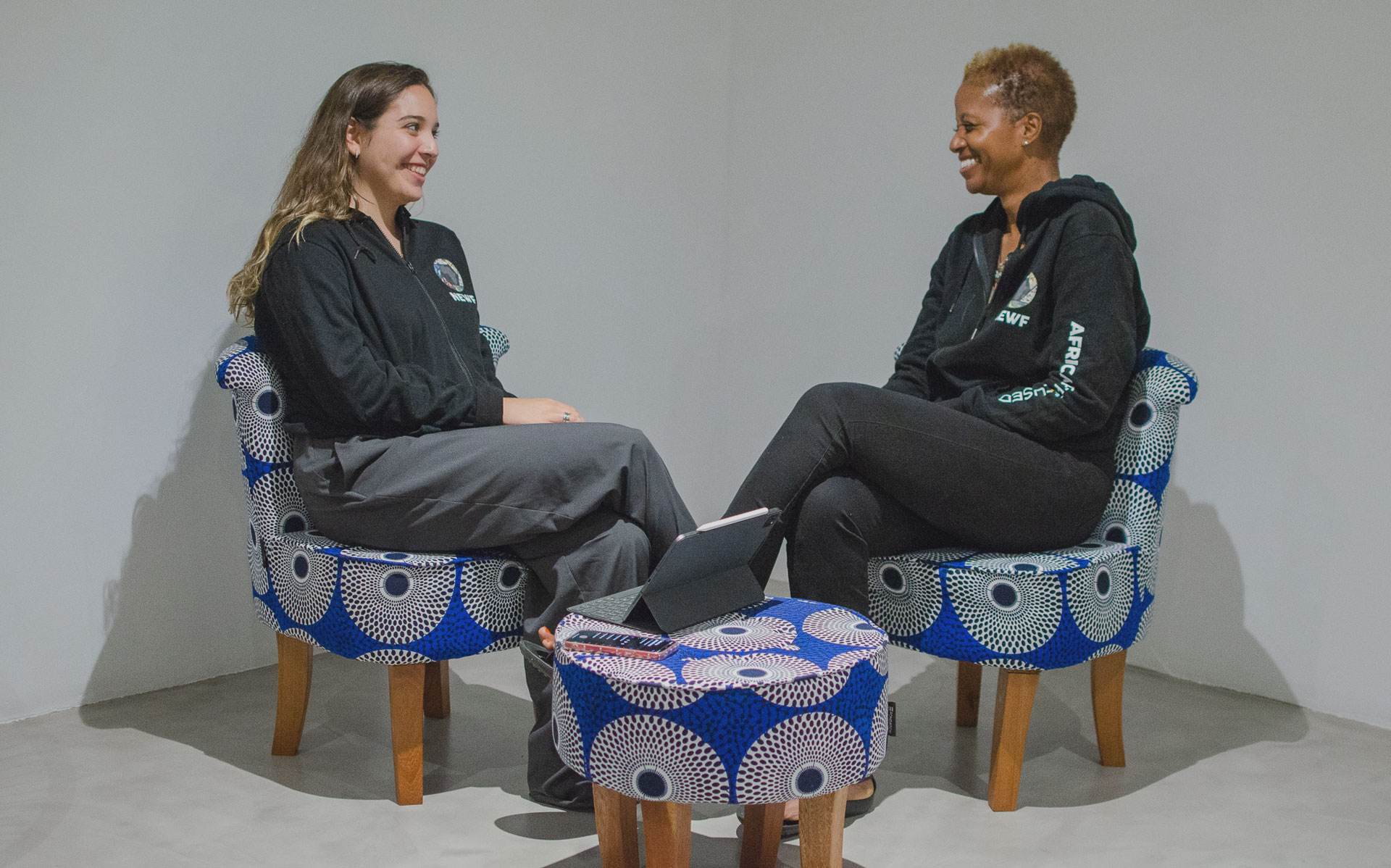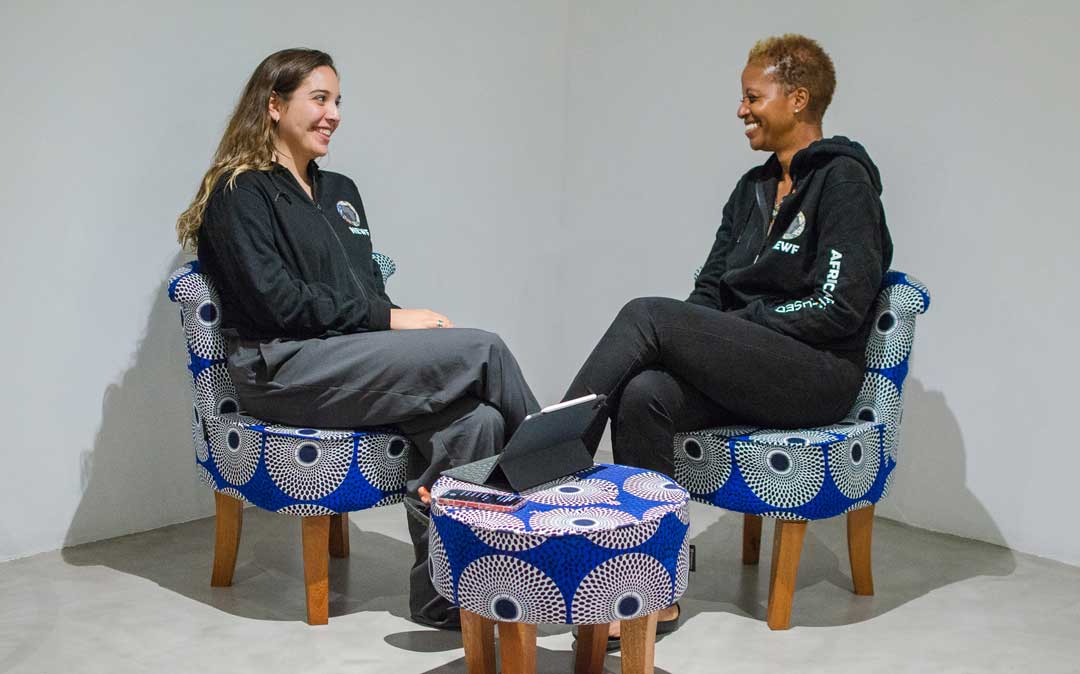Q: How did you get involved with the Diving with a Purpose organization, and what has your experience been like working with them?
“When I saw that picture in the museum, I reached out to the organization to learn more. Initially, I wasn’t thinking of myself as a diver; I was merely interested in supporting the organization. I got in touch with Mr. Kenneth Stewart, and after many conversations, he invited me to dive with them. It was Ken’s invitation that really got things started for me. He secured a spot for me in the “Underwater Adventure Seekers” class, where I learned to dive
and completed 30 ocean dives before participating in DWP training.” Tara explains that it took her a year to complete all her training, but through this process, she met inspiring people involved with DWP. This inspired her to raise awareness about their incredible work.
She thought, “Maybe I am the person who can help tell stories about them.”
Diving with a Purpose
Q: Can you discuss a particularly memorable or impactful dive you've experienced with Diving with a Purpose?
One memorable dive happened while Tara was training for Diving With a Purpose in Sri Lanka. She says: “I was trying to complete my 30 dives. My first dive went great; I remembered my signals and felt confident. During the second dive, I was swimming around a beautiful reef with my instructor. Near the end of the dive, my instructor pointed out something on the reef, signaled for me to look, and then swam away. As I hovered over the
reef, a pretty fish swam towards me. At first, I thought, “Wow, this fish likes me; we can be friends.” But as it got closer, I realized its mouth was open, and it had big teeth. In an attempt to protect myself, I put my hand out, and the fish bit off the tip of my finger. We had to perform an emergency ascent skipping our 3-minute safety stop. Afterwards, I emailed Ken and Kamal a picture of my finger. They both said, “Oh, you are a real diver now.” It felt
like the ocean was requiring a little sacrifice to start this journey, marking my initiation into the adventure ahead.”
Challenges and Discoveries
Q: What are some of the biggest challenges you’ve faced while exploring and documenting underwater archaeological sites, and how does it influence your storytelling?
“I began this journey wanting to tell stories about the divers and the shipwrecks, focusing on the adventure. But the more I got into this work, the more I realized there was a much bigger story to tell, one that was missing from the history books. This journey has reconnected me with my history in unexpected ways. I never anticipated the story would become so personal.
I realized how much pain I had avoided because I was afraid to confront this history. However, the more I delved into this work, the more courage I developed to face it. I discovered healing, joy, and beauty on the other side.” This realization has profoundly influenced Tara Robert’s storytelling.
Q: Have there been any discoveries that profoundly changed your understanding of history?
“Yes, definitely. I learned many facts I didn’t know before. For example, nearly 2 million Africans lost their lives during the Middle Passage. I asked myself, ‘Why didn’t I know this?’
This information frames history in a new way for me. This work has also reconnected me with Africa in unexpected ways, transforming and complexifying my understanding of history. On a personal note, I hired a genealogist to trace my family history. Inspired by the pride
others had in their ancestors, I wanted to look back at my own. My great-great-grandfather Jack, born in 1839, was enslaved in North Carolina. We found that Jack managed to purchase 174 acres of land in a slave state, fought in the Civil War as part of the United States Colored Troops, and was a delegate at the Freedmen’s Convention. Initially, I avoided looking into Jack’s history, fearing it would be too painful. But I discovered that Jack,
while not perfect, was human. This journey has changed my perspective both personally and historically.”
Personal Reflections
Q: What advice would you give to aspiring young minorities who want to contribute to maritime storytelling and conservation?
Tara paused thoughtfully before answering: “Are there clear pathways for maritime storytellers? I don’t think there are clear pathways. Becoming a member of Diving With a Purpose is a start. Much of my storytelling began with me picking up a pen or a camera and starting to tell the stories around me, using the outlets available to me. During college, I interned each year with magazines that would have me. I believe there are many ways to
create opportunities for yourself, but it begins with picking up a camera or a pen, looking around you, finding what captivates you, and writing about it.”
“Treat writing with respect; it takes skill and is an art form. Anyone can become a good writer, as it is a skill available to everyone. However, it’s not just about picking up a pen and writing. Take a class, join a school club where there is mentorship, and treat it seriously to gain experience.”
Future Endeavors
Q: What are your upcoming projects in your work with maritime archaeology and telling the African diaspora?
“The upcoming project is called the Return Expedition. It is a reverse boat journey of the transatlantic slave trade. We will visit approximately 27 countries on all four continents over the course of a year and a half. The goal is to honor significant sites, gather forgotten stories about the trade's legacy, memorialize the lives lost in the ocean, and acknowledge this pivotal moment in global history.”
Q: How do you see the role of organizations like Diving with a Purpose evolving in the future, especially in terms of cultural heritage and ocean conservation?
“I think what’s already happening with DWP is extending beyond borders and becoming a global organization. The mission involves working alongside communities worldwide to reclaim the submerged history of people of African descent. This conversation we’re having with NEWF is incredible. NEWF brings storytelling to DWP, which is something DWP lacks, while DWP offers NEWF a connection to underwater archaeology. By connecting these two in interesting ways, something powerful can happen. There is a lot of our history in the waters, and it would be amazing to have teams worldwide helping to bring it back into memory.”
Closing Thoughts
Q: Finally, how can our readers support your work and the initiatives of Diving with a Purpose?
“We are always looking for funding,” Tara laughs. “DWP is looking for funding, and the Return Expedition is looking for funding. But beyond that, we need ready and open minds, willing to think about our history differently. We need courageous minds, willing to pay attention to and share the findings of DWP and NEWF. People can support us by making way for this work, stepping into it, and sharing it. We aim to change the global narrative about us as Black people. To do that, we need more and more people.”


